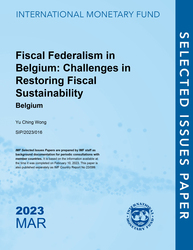
Fiscal Federalism in Belgium: Challenges in Restoring Fiscal Sustainability Belgium: Belgium
Fiscal decentralization in Belgium progressed substantially in 2015-19. However, as decentralization of expenditure responsibilities continued to outpace decentralization of revenue authority, vertical fiscal gaps and greater reliance on transfers from shared resources may have..
READ MORE...
Volume/Issue:
Volume 2023
Issue 016
Publication date: March 2023
ISBN: 9798400235511
$15.00
Add to Cart by clicking price of the language and format you'd like to purchase
Available Languages and Formats
| English |
Prices in red indicate formats that are not yet available but are forthcoming.
Topics covered in this book
This title contains information about the following subjects.
Click on a subject if you would like to see other titles with the same subjects.
Economics- Macroeconomics , Money and Monetary Policy , Public Finance , International - Economics , fiscal policy , fiscal consolidation , taxation and revenue , budget , deficit , and debt , state and local governments , federal and subnational public finances , fiscal decentralization , federalism , decentralization of expenditure responsibility , community government , consolidation plan , Subnational government , Article IV Consultation Staff Report , Fiscal federalism , Fiscal stance , Global
Summary
Fiscal decentralization in Belgium progressed substantially in 2015-19. However, as decentralization of expenditure responsibilities continued to outpace decentralization of revenue authority, vertical fiscal gaps and greater reliance on transfers from shared resources may have reduced spending discipline. Consecutive shocks (pandemic, energy prices) have worsened the fiscal positions of all levels of government, requiring urgent and concerted effort to improve fiscal and debt sustainability. Fostering better fiscal policy coordination across all levels of government would improve the efficiency of Belgium’s decentralized fiscal framework. We recommend that fiscal adjustment at the subnational levels should be a part of the general government fiscal consolidation plan, with strict spending limits applying; integrating systematic spending reviews in the budgetary process; and adopting a more strategic, multi-annual fiscal framework to support adjustment. Implementing the 2013 Cooperation Arrangement—intended to provide fiscal rules to govern and coordinate public finances at all levels—is important. Also, the cost of overborrowing at the regional level should be fully internalized; recalibration of transfers could be considered; and some flexibility should be retained in the pace and scope of further decentralization. Finally, there is scope to improve the integration of fiscal sustainability objectives in federal and subnational structural reforms.
Copyright © 2010 - 2026
Powered by:
AIDC



